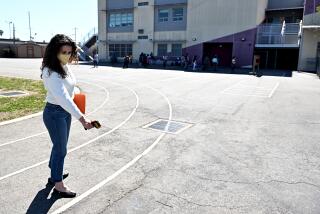Poll Gives L.A. Schools Low Marks : Education: System does not adequately prepare students for job market or college, substantial majority of public says.
A substantial majority of parents, teachers, school administrators and the general public thinks the Los Angeles public school system is failing to adequately educate its students or prepare graduates for the job market, according to a poll of more than 2,400 area residents released Tuesday.
Most people queried said they would be willing to pay higher taxes to fund schools if the system were reformed to shift more control over spending and curriculum from the state and district to local campuses.
The poll showed “public education is the number one priority of residents in the Los Angeles Unified School District, far above such issues as crime, transportation and the environment,” pollster Louis Harris said at a press conference on the results.
The telephone poll, conducted last spring by Louis Harris and Associates Inc., was commissioned by three business groups interested in improving education: the Los Angeles Educational Partnership (LAEP), which funds classroom innovations; the 2000 Partnership, a civic organization formed to help the city plan for the future, and the Los Angeles Educational Alliance for Restructuring Now (LEARN), a 6-month-old coalition of business, community and education leaders pushing for school reform.
Respondents--including 647 parents, 600 teachers, 209 school principals, 200 senior district administrators and 780 residents with no children in public schools--were randomly selected from representative samples.
The poll--designed to gauge public support for overhauling the giant Los Angeles district--has a margin of error of from 3 to 7 percentage points.
More than two-thirds of those questioned said the district is not doing a good job preparing high school students for jobs after graduation, and almost as many said the district’s graduates are not well-equipped for college.
The public perception of junior high schools was slightly better. Only elementary schools received a favorable rating--and just barely, with about half of the respondents saying they were doing a good job.
When asked to evaluate specific components of campus life, 80% of the parents and non-parents said the district has failed to control crime and drugs in the schools, 70% said discipline is not properly enforced and there is too much racial tension among students, and 76% said the district does not properly distribute its money among schools and programs.
Teachers were even more critical in their assessment of school funding, building maintenance and campus discipline. Only school principals gave the district consistently high marks.
“The bad news is people do indeed have a bad estimate of the Los Angeles school system and the way it works,” Harris said. “The good news is they are not giving up.”
The notion of giving schools--rather than the central bureaucracy--more control was overwhelminging supported by teachers, administrators, principals and the general public. Parents favored the idea, but by a smaller margin, with 61% saying individual schools should be able to make their own decisions on spending and curriculum.
The concept of local control is embodied in the district’s 2-year-old school-based management program, but some parents have complained that they have been shut out of the process they contend was dominated by teachers.
Parent respondents were clear that they would like to have more input and influence in their children’s schools. Ninety-three percent said children perform better if their parents are involved, and 95% said schools would improve if parents could make more decisions on campus.
While the poll drew a dismal picture of most elements in the school district, opinions on teachers were mixed. Elementary teachers were rated excellent or good by 61% of the parents, junior high teachers were rated highly by 48%, and 50% of the parents said high school teachers are doing a good job. Parents and teachers were rated the most important players in improving the quality of education.
But parents said they feel teachers are now hamstrung in their efforts--overburdened by paperwork and lacking enough authority to decide how to teach and manage their classrooms. District administrators, principals and the school board are generally perceived as ineffective by parents and the public.
“It simply vindicates all the things we’ve been saying for the past few years,” said teachers’ union President Helen Bernstein. “I’m not glad that people think the system’s not working, but I am glad people are aware of its problems.
“What they overwhelmingly endorsed is putting more power in the schools . . . and not letting restrictions get in the way.”
In addition to school-based management, the district took a step toward transferring more authority to local schools with a reorganization plan put in place this summer by Supt. Bill Anton. It will ultimately let individual schools decide how to spend their money and tailor instruction to meet their students’ needs.
LEARN also intends to introduce a reform plan next year that will draw on the ideas of parents, teachers, business and community leaders, education experts and district officials.
Public education is critically underfunded, LEARN President Mike Roos said Tuesday, “but people are not willing to talk money until they see change.”
Indeed, between 84% and 97% of the various groups polled said they would be willing to pay $100 in additional taxes a year to fund improvements to Los Angeles public schools.
But respondents were clearly unhappy with the way the district spends its money--80% said the system should use its money more effectively.
Poll’s Key Findings
Here are some of the findings of the poll done on the Los Angeles Unified School District last spring.
IMPORTANCE OF PUBLIC EDUCATION TO L.A. RESIDENTS
In contrast to many other urban areas, public education is clearly the No. 1 priority.
* Eight in 10 support increased funding for the district if the money is spent more efficiently.
* Three-quarters of the public are willing to pay $100 more a year in taxes to improve schools.
* Almost two-thirds of the public feel a well-educated work force is essential to keep businesses from leaving.
STATE OF THE SCHOOLS
* By overwhelming margins, those interviewed said the district is failing to achieve its basic objective.
* Teachers get moderately good marks, while principals, administrators and school board members are rated low.
* Crime and drug control, discipline, distribution of money to schools and programs and the way students of different racial and ethnic groups get along are all rated very negatively.
HOW TO IMPROVE THE DISTRICT
* All groups support school-based management, which transfers power to local campuses.
* Teachers should be given more authority to decide how to teach.
* A majority of the public believes business has a major responsibility to help students develop better skills.
School Survey
Here are some of the responses from a poll conducted by Louis Harris & Associates, last spring, involving 2,436 telephone interviews with a randomly selected group of Los Angeles area residents and Los Angeles Unified School District employees.
The poll was commissioned to assess public support for education reform by the Los Angeles Educational Partnership, the Los Angeles Educational Alliance for Restructuring Now (LEARN) and the 2000 Partnership. It has a margin of error of between 3 and 7 percentage points. The “public” category includes parents and non-parents. * Which would be the best way to raise more money for the district?
Public Parents (Number Respondents (1,247) (577) in Parentheses) % % Increase sales taxes 40 37 Increase property taxes 24 26 Increase income taxes 23 24 Others 10 9 Not sure 6 7
* If you had $100 to spend and you could divide it any way you like, depending on what you feel is most important and where you think it would do the most good, how much would you spend on the following services?
Public Parents (Number Respondents (1,421) (641) in Parentheses) % % Public education 34 38 Social services 19 17 Crime control 17 17 The environment 12 10 Transportation 8 8 Recreational services 8 8 Other services 2 2
* How much responsibility do non-parents living in Los Angeles have to improve public education?
Public Parents Teachers Principals (Number Respondents (1,421) (641) (600) (209) in Parentheses) % % % % A great deal 35 37 48 59 Some 41 37 36 32 Not too much 16 19 12 8 None at all 6 6 3 NA Not sure 2 2 NA NA
Administrators (Number Respondents (200) in Parentheses) % A great deal 56 Some 30 Not too much 11 None at all 4 Not sure 1
* Do you feel that the money allocated to education is being spent in the right way, or could it be used more effectively?
Public Teachers Principals (Number Respondents (1,000) (531) (156) in Parentheses) % % % Yes, spent in the right way 14 8 23 No, could be used 81 90 75 more effectively Not sure 5 2 2
Administrators (Number Respondents (144) in Parentheses) % Yes, spent in the right way 20 No, could be used 77 more effectively Not sure 4
* If you had the flexibility to send your child to any school, how important would the following reasons be in your decision?
(Number Respondents (641 Parents) in Parentheses) % of Parents Saying Very Important A school where students learn more 91 Safety 89 More activities, 68 services and programs Your involvement in 68 decision-making at the school Distance from home 61
More to Read
Sign up for Essential California
The most important California stories and recommendations in your inbox every morning.
You may occasionally receive promotional content from the Los Angeles Times.










